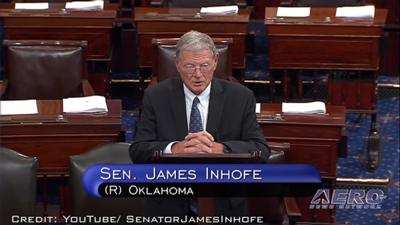But Committee Unable To Vote On Legislation Due To Lack Of A Quorum
U.S. Sen. Jim Inhofe (R-OK) thanked the Senate Commerce Committee for concluding a markup of the Pilot’s Bill of Rights 2 (PBOR2) today and praised the adoption of an amendment authored by Sen. Joe Manchin (D-WV) to further improve and address the legislation's third class medical certification provision. While markup had concluded on the legislation, the committee did not have a quorum at the end of its business meeting in order to vote on final passage.

“I welcome Sen. Joe Manchin’s amendment to the Pilot’s Bill of Rights 2 that was adopted in the Senate Commerce Committee during markup of my legislation,” said Inhofe. “This amendment has my full support as it further improves the third class medical provision. Currently, FAA’s medical certification process is bureaucratic, burdensome and discourages pilots from disclosing and treating medical conditions that could impact their ability to fly. With this amendment, the bill provides a new medical certification process for qualified and trained pilots that encourages a robust dialogue between pilots and their personal physician. It requires pilots to complete a medical education course every two years and be treated by their physician for any medical diagnosis that could impact their ability to fly. In short, this bill reforms the medical certification process for general aviation pilots in a way that will increase pilots’ knowledge of risk while demanding
robust treatment of identified conditions. I want to thank Senator Thune for holding the markup and Senator Manchin for his partnership, hard work, and support on this bill. This bill addresses some of the most important issues presently facing pilots and the general aviation community, and with 68 cosponsors, I expect this bill to continue making progress in the Senate.”
Manchin’s amendment made the following changes that were supported by Inhofe:
In order to qualify for the new third class medical certification, every new pilot will be required to first obtain a medical evaluation in line with current FAA practices. Existing pilots will automatically qualify for the new certification process under most circumstances. This ensures all pilots have a baseline evaluation of their health and a verification of their existing medical records—a “one touch” medical assessment using the current FAA process.
In addition, pilots qualifying for the new policy will need to do the following:
Complete every two years a new online medical education course that includes information related to warning signs for serious medical conditions, mitigation strategies for medical conditions, and the impacts of over-the-counter and prescription medications and their interplay with an individual’s flight capabilities. This course takes aviation safety further than any existing medical requirement for the general aviation community. Pilots will need to maintain a record of their online course certification in the logbooks.
Have regular examinations, at least every four years, by a qualified physician and receive the appropriate care and treatment for any diagnosed medical condition—both at the outset and over the long term. Should an individual fail to be under the care and treatment of a qualified physician, they would not be able to maintain the privilege of the new certification process. Pilots will need to maintain a record of their physician visits and a certification of any care and treatment as directed by a doctor in the logbooks. As part of their certification of any needed ongoing medical care, pilots will also certify their understanding of FAA’s existing prohibition on operating an aircraft in the event of a medical deficiency.
If a pilot who qualifies for the new third class medical certification is clinically diagnosed with a severe mental health disorder, a severe neurological disorder, or a severe cardiovascular condition, the pilot would be required to go through FAA’s special issuance process one time to receive medical clearance to fly again, ensuring FAA the opportunity to review the medical documentation, order additional tests as necessary, and make a determination on medical clearance. Once a pilot has received an initial medical clearance to fly from FAA, that individual would be able to once again exercise flying privileges under the new third class medical certification process.

Due to the unique nature of mental health and neurological disorders, individuals with severe mental health or neurological diagnoses, who have already successfully completed the special issuance process, will need to certify every two years that they remain under the care and treatment of their specialist. In addition, that individual will no longer qualify for the new third class medical certification if their medical specialist determines their condition has deteriorated to the point that they are no longer fit to fly. Lastly, if an individual’s driver’s license is revoked for any health related reason, the third class medical certification will be revoked.
The Manchin amendment also directs FAA to expand the number of medical conditions that are included in the “Conditional AMEs Can Issue” program to find ways to streamline the current process for obtaining a special issuance medical certificate.
On Feb. 26, Inhofe introduced the Pilot’s Bill of Rights 2, legislation that would reform the third class medical certification for recreational pilots and broaden the protections provided in the original Pilot’s Bill of Rights authored by Inhofe and signed into law in 2012. At the time of this release, S.571 had 68 cosponsors, surpassing a filibuster-proof majority in the Senate.
“General aviation has been losing an average of 6,000 pilots per year over the past 10 years. Manufacturing of new piston powered aircraft in the United States has fallen drastically, and this critically important amendment includes provisions that will help general aviation move in a positive direction and provides common sense safety protections to pilots,” said 17 aviation organizations in a letter to the Commerce Committee in support of the modifications.
“Sen. Inhofe and the other bipartisan co-sponsors in the Senate and House understand the importance of providing for the fair and equitable treatment of all airmen by introducing the second Pilot’s Bill of Rights, and we appreciate their work to move these important measures forward. Aeromedical reform is an urgent need that is overwhelmingly supported by our members and other recreational pilots. We also strongly support the common-sense provisions ensuring due process for airmen in enforcement cases and liability protections for designees conducting important aviation safety activities once exclusively handled by the federal government,” said Jack Pelton, chairman of the board for the EAA.
“I applaud Sen. Inhofe for his bipartisan leadership in introducing the Pilot’s Bill of Rights 2. This legislation includes much-needed, common-sense reforms for the general aviation community. It is critically important that the third-class medical issue is resolved quickly, and this bill sends a clear message to the bureaucracy to get it done. Additionally, in this time of rapid communications technology, it is unacceptable that the NOTAM system remains broken—this bill will help to fix it. Finally, the liability protections offered to volunteer pilots in this bill are extremely important to the nation as general aviation continues to provide transportation for cancer patients, wounded veterans, and other citizens requiring assistance to access needed medical care,” said Pete Bunce, president and CEO of GAMA.
“On behalf of the 2,700-plus pilots represented by the NetJets Association of Shared Aircraft Pilots (NJASAP), I write today to express our support for your legislation, the Pilots Bill of Rights 2 (PBR2). As co-chairs of the Congressional Pilots Caucus, you continue to keep issues that affect professional and recreational pilots at the forefront of the Congressional consciousness. Your work on PBR2, which is highlighted by efforts to extend the due process rights of all certificate holders facing FAA investigation or enforcement action as well as enhancing the Notice to Airmen Improvement Program, is a perfect example of your proactive leadership on behalf of the pilot community,” said Pedro Leroux, president of the NetJets Association of Shared Aircraft Pilots (NJASAP).
“We sincerely appreciate Sen. Inhofe for his support of our nation’s professional pilots. Our career security is vulnerable to a wide range of factors frequently beyond our control. This bill would provide necessary balance to administrative proceedings and other venues in which pilots face potential certificate denial, suspension or revocation,” said Capt. Keith Wilson, president of the Allied Pilots Association.
“Time and again, Sen. Inhofe has served as a tireless advocate for professional pilots. He understands the unique challenges that pilots face, with S.571 providing yet another example of his thoughtful pragmatism. We urge Sen. Inhofe’s fellow lawmakers to approve this legislation promptly,” said Capt. Paul Jackson, president of the Southwest Airlines Pilots’ Association.
“The introduction of the Pilot’s Bill of Rights 2 is great news for the general aviation community and we are grateful to Sen. Inhofe for putting forward this legislation that would do so much to help grow and support general aviation activity. Pilots have already waited too long for medical reform, so we’re particularly pleased to see it included in this important measure. We will actively work with Congress to build support for this legislation that is so vital to the future of GA and the 1.1 million jobs that depend on it,” said Mark Baker, president of AOPA.
(Source: News release from Sen. Inhofe)
 ANN's Daily Aero-Term (12.19.25): Ultrahigh Frequency (UHF)
ANN's Daily Aero-Term (12.19.25): Ultrahigh Frequency (UHF) NTSB Prelim: Cirrus Design Corp SR22T
NTSB Prelim: Cirrus Design Corp SR22T Classic Aero-TV: The Red Tail Project--Carrying the Torch of the Tuskegee Airmen
Classic Aero-TV: The Red Tail Project--Carrying the Torch of the Tuskegee Airmen Aero-News: Quote of the Day (12.19.25)
Aero-News: Quote of the Day (12.19.25) Airborne 12.17.25: Skydiver Hooks Tail, Cooper Rotax Mount, NTSB v NDAA
Airborne 12.17.25: Skydiver Hooks Tail, Cooper Rotax Mount, NTSB v NDAA




